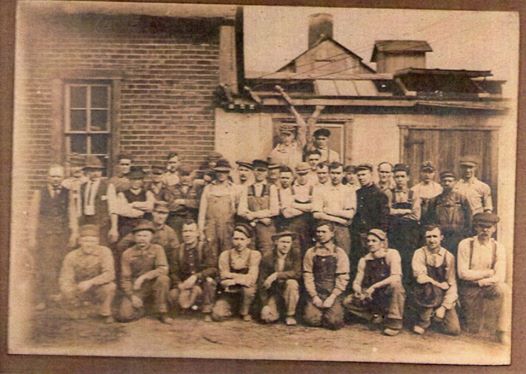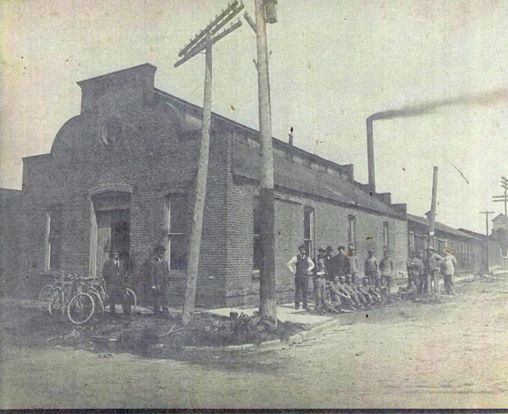
Copyright © 2009-2020
North Manchester
Historical Society
All rights reserved.
Please contact
our Center for History
if you find
inaccuracies or
inappropriate content.
|
Source: North Manchester Journal, October 7, 1909
CLOSING FOUNDRY CONTRACT.
Mr. Garwood Here With Force of Men to Go to Work
at Once.
A.R. Garwood and two or three of his associates from
Wellsburg, West Virginia, are here this week, and the
contracts were being closed Wednesday by which the
Industrial association and the citizens of North
Manchester will contribute two thousand dollars toward
assisting to start a foundry. The old Dunbar building
has been bought for this purpose, and a force of men
will be put to work in a few days making the needed
changes, so that it is expected the foundry will be
ready to run by the first of January. Not quite all of
the two thousand dollars necessary for the fund has been
subscribed, and the Industrial association has to draw
on its treasury to supply the balance.
Monday evening there was a meeting with Mr. Garwood that
resulted in considerable enthusiasm, and at which the
soliciting committees reported. Still farther canvass
was made Tuesday with good results. A foundry is an
enterprise for which there is great demand here, as has
been mentioned before in the Journal and it is to be
hoped that the conference that was being held Wednesday
when the Journal went to press will result in an
agreement that will quickly produce the results, and
about which there will need to be no delay.
Source: Aurora (1927) Ad:
North
Manchester Foundry Co. Inc.
The foundry is one of
the leading industrial enterprises of the city. It is
chiefly occupied in making school desk and opera chair
castings for the Peabody School Furniture Company.
Practical and economical heating and laundry stoves are
also products of the foundry.
Manchester College has been more closely connected with
the foundry than perhaps any other business firm in
North Manchester. Mr. John Stauffer, for many years the
president of the corporation, was at the time of his
death one of the trustees of the college; Robert
Stauffer, our basketball coach is Secretary-Treasurer;
and Prof. Roy Dilling, a member of our Music faculty is
Vice President. They have been friends and supporters to
whom we are greatly indebted.
Source: Ravelings
(1949) Ad:
North Manchester
Foundry
Makers of HEATING AND LAUNDRY STOVES
Also Grey Iron Castings
Phone 153
Source: News-Journal, August 16, 1973, Centennial
Section
Foundry Incorporated 1911
The North Manchester Foundry
Company was incorporated July 3, 1911. Common stock was
issued to J.C.F. Martin, president; W.J. Ranger,
vice-president and John Stauffer, secretary-treasurer.
John Stauffer purchased the stock of W.J. Ranger in 1913
and the stock of J.C.F. Martin in 1919. Stauffer had
come to North Manchester earlier after a foundry he had
operated in Dayton, Ohio burned out.
The major part of the common stock
remained in the Stauffer family until January 1947, when
all of the outstanding common stock was purchased by the
M.H. Detrick Company with main offices in Chicago. After
this transaction the foundry became a division of the
M.H. Detrick Company.
John Stauffer served as general manager from 1911 until
his death in April of 1927. His son, R.M. Stauffer
succeeded him as general manager and operated the
foundry until 1947 at which time he was responsible for
the sale of the foundry to the M.H. Detrick Company.
Due to the successful operation of the foundry from 1927
to 1947 the M.H. Detrick Company appointed R. M.
Stauffer a vice president and retained his services as
general manager until his retirement in 1968. Upon
retirement R.M. Stauffer was replaced by Rolf Westman
who is currently operating the foundry as vice president
and general manager.
The foundry was originally organized to manufacture
castings for the Peabody Seating Company. for twenty
years this casting production represented about 90
percent or more of the total production. In the early
1930s the foundry was forced to branch out into other
lines of castings due mainly to the fact that steel
moveable school desks began to replace the cast iron
stationary desks.
Among other types of production, the foundry began the
manufacture of coal and wood burning heating and
laundry stoves. The company produced 20 to 25 thousand
stoves a year in the late 1930s and early 1940s. The
decline of coal for home heating soon reduced the need
for stove production.
In 1935 the foundry began making castings for the Ford
Meter Box Company in Wabash. This business has been
continued since that time and the Ford Meter Box Company
is still considered among the larger customers for
castings from the foundry.
During World War II the foundry produced farm machinery
castings for the J.I. Case Company of Rockford, Ill.
These castings carried a high priority rating,
therefore, the foundry experienced no difficulty in
obtaining raw materials for their war time production.
Soon after World War II the M.H. Detrick Company bought
the foundry. At that time Detrick operated two other
foundries, one at Newark, N.J. and the other at Peoria,
Ill.
The M.H. Detrick Company closed the Newark foundry
operation in 1958 and moved the production pattern
equipment to the North Manchester plant. Expansion of
the North Manchester facility was planned and
construction started in November 1959 with a rebuilding
and addition to the plant.
In 1964 the Peoria, Ill., foundry was closed and more
equipment moved to North Manchester. At the present time
the North Manchester Foundry is the only M.H. Detrick
foundry in operation.
Since construction program started in November 1959, it
has been a continual expansion and improvement with
future plans still being made. In 1965 a pallet line
molding operation was installed with conveying equipment
and lift trucks for a much improved materials handling
operation.
In 1968 an air conditioned lunch room was provided for
employee convenience and comfort. In 1970 a first aid
room was installed along with more production
improvements.
With air pollution control laws being enacted plans were
formulated and two new electric induction furnaces were
installed and began operation in October of 1971. The
electric furnaces replaced the cupola melting operation
that had been used in the foundry for 60 years. The
electric melting operation has been successful enough to
warrant a decision by the M.H. Detrick Company to add a
third electric furnace for additional expansion to the
production facility. Plans call for the third furnace to
be in operation by the end of 1973.
The 200 employees of the North Manchester Foundry
participate in the following employee benefits:
1. Savings and Profit Sharing.
2. Group hospitalization and life insurance.
3. Vacation pay.
4. 10 paid holidays.
5. Other company sponsored activities including
participating and spectator sports.
6. Profit sharing cash bonus.
VINTAGE PHOTOS OF NORTH
MANCHESTER FOUNDRY & WORKERS-
  
Source: NMHS Newsletter Nov 2002
North
Manchester Foundry
The North Manchester Foundry
Company was incorporated July 3, 1911. Common
stock was issued to J. C. F. Martin, president
W. J. Ranger, vice-president and John Stauffer,
secretary-treasurer. John Stauffer purchased the
stock of W. J. Ranger in 1913 and the stock of
J.C.F Martin in 1919. Mr. Stauffer had come to
North Manchester
|
| |
| |
Page One
|
|
| |

|

|
|
earlier after a foundry he
had operated in Dayton, Ohio burned out. The
major part of the common stock remained in the
Stauffer family until January 1947 when all of
the outstanding common stock was purchased by
the M. H. Detrick Company with main offices in
Chicago. After this transaction the foundry
became a division of the M. H. Detrick Company.
John Stauffer served as
general manager from 1911 until his death in
April, 1927. His son Robert M. Stauffer
succeeded him as general manager, and became a
vice-president of the Detrick Company and
continued to manage the North Manchester plant.
The foundry is one industry that has never called
upon the town for financial assistance.
The foundry was originally
organized to make castings for the Peabody
Seating Company and for approximately twenty
years this production was 90 per cent or more of
the total castings produced. In the early 1930's
the foundry was forced to branch out into other
lines of castings due mainly to the fact that
steel movable school desks began to replace the
cast iron stationary desks. Among other types of
production, the foundry began the manufacture of
coal burning heating and laundry stoves,
producing 20 to 25 thousand stoves a year in the
late 1930's and early 1940's. Then the use of
coal began to decline and stove production was
phased out. In 1935 the foundry began making
castings for the Ford Meter Box Company at
Wabash.
During World War II the
foundry produced farm machinery castings for the
J. I. Case Company of Rockford, Illinois. As
their castings carried a high priority rating,
the foundry experienced no trouble in getting
raw materials. Soon after the war when the M. H. Detrick Company purchased the plant the work for
the company took an increasing percentage of the
total capacity. This production was engineered
refractory heat enclosures which are applied to
open hearth
|
|
| |
|
| |
|
|
Page Two
|
|

|

|
|
furnaces, metallurgical and
steel processing furnaces, refuse incinerators,
clinker coolers for the cement industry, etc. M.
H. Detrick Company operated foundries at North
Manchester and Peoria, Illinois to produce
mechanite metal for heat resisting castings
which support the special fire brick shapes.
Foundry operations were not
highly mechanized due to the great variety of
patterns involved in their production. The new
building improved production somewhat going from
melting 22 to 24 tons of iron daily to a
capacity of 30 to 36 tons daily.
In 1959 the plant began a
rather unique plan of construction of a new
building. The entirely new structure was built
over the old structure without interrupting
operations within the old structure. Once the
outer structure was complete, the removal of the
old structure began and that was completed by
1961. In the summer of 1961, on the fiftieth
anniversary of incorporation the management
considered having a day for open house but
decided it was impractical. They did invite any
who were interested in watching the iron being
poured to call and arrange to watch any
afternoon from Monday to Friday. Visitors on any
day were to be limited. The new building had a
50 per cent greater capacity than the old.
Smoke pouring from the
chimney of the new plant was a daily sight as
the fire was lighted in the big cupola every
morning about 10:00 o'clock. Within a few
minutes after the proper heat was reached the
smoke was dissipated and the cupola was loaded
with the metal to be melted. Iron was poured
every day from 2:00 o'clock until 4:30.
In addition to Robert
Stauffer, other members of the management staff
in 1961 were Clyde Brindel who had been with the
foundry since 1915 and became plant
superintendent in 1935; Don Roberts who joined
the company in 1927 and had been foundry
superintendent since 1945; Jack Richards who had
worked since l938 and had been assistant foundry
superintendent since 1959; Dale Berry who had
worked since 1947 and had been in charge of
quality control since 1960; Gene Coe had been
office manager since 1955. Workers in the plant
included Dick Reed, Laymon Howard, Ronnie
Bridegroom, Roy Hippensteel , Homer Kerr and
Charlie Conrad. There were as many as 85 on the
payroll in about 1960.
|
|
[Continued on Page Four]
Page Three
|
|

|

|
|
The North Manchester Foundry
was among the first in this area to install a
profit-sharing plan for its employees beginning
in 1935. Group insurance benefits began in 1929,
vacation pay in 1944, holiday pay in 1950 and an
employee loan plan since 1954. All of these were
innovative at the time.
|
|
|